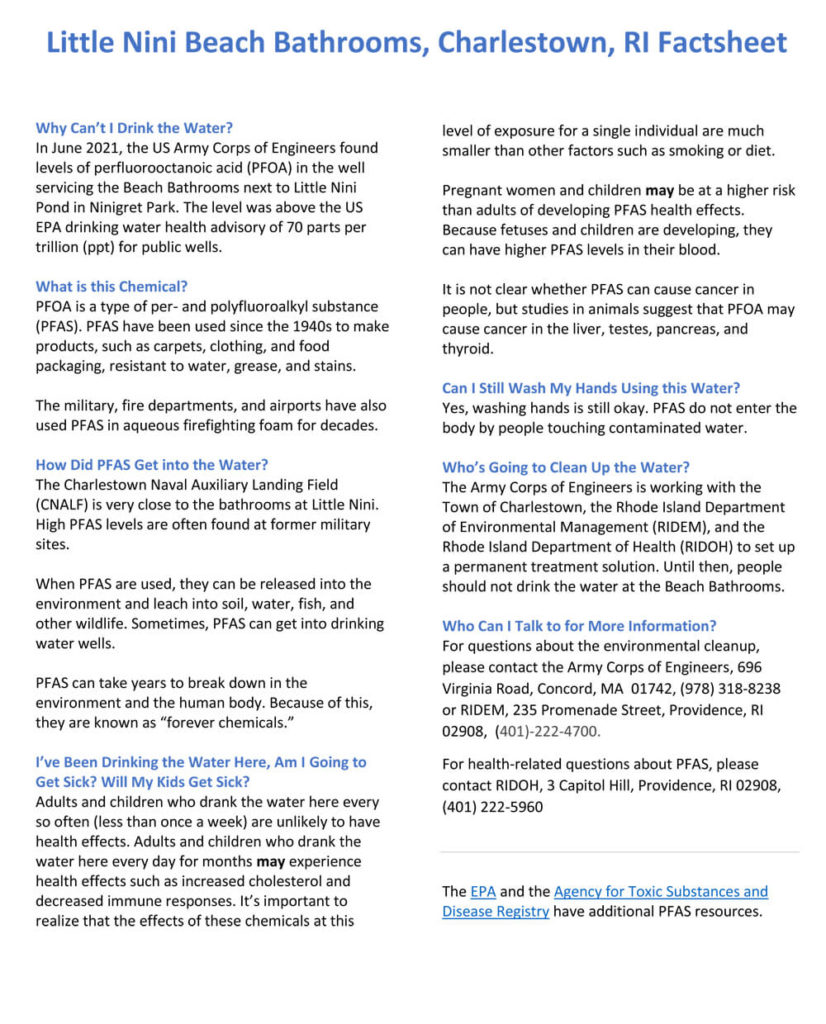Elevated Levels Of PFAS Found In Some Wells At Ninigret Park
Charlestown has been notified by the the Army Corps of Engineers that elevated levels of PFAS (per- and polyfluoroalkyl substances) have been found in some of the wells at Ninigret Park. The wells are not used for drinking water.
Per- and polyfluoroalkyl substances (PFAS) are a group of man-made chemicals that have been manufactured and used in a variety of industries around the globe, including in the United States since the 1940s. PFOA and PFOS have been the most extensively produced and studied of these chemicals. Both chemicals are very persistent in the environment and in the human body – meaning they don’t break down and they can accumulate over time. There is evidence that exposure to PFAS can lead to adverse human health effects.
The Army Corps testing of well water is part of their ongoing monitoring of the former U.S. Navy landing site at Ninigret Park. The wells where PFAS were found are not used for drinking water, but out of an abundance of caution to make sure the water is not used for drinking, signs have been posted at the bathrooms near Little Nini Pond to notify people not to use the water from the sinks to drink.
The Army Corps will continue to conduct additional, expanded testing of these wells. The Town of Charlestown is relying on the Army Corps of Engineers to resolve this issue. The town has promised to update the community as new information becomes available.
Information about PFAS is available from the EPA and the Agency for Toxic Substances and Disease Registry. The Town of Charlestown prepared the fact sheet below about PFAS in cooperation with the RI Department of Health to help answer questions.

July 1, 2021 @ 6:26 am
Is Ninigret Pond also tested for this chemical as that would be effecting clams and oysters?
June 24, 2021 @ 5:43 pm
If PFAS are “ not dangerous” ( according to this article), then why is the Army Corps of Engineers studying them? I’m sure they have enough to keep them busy what with sea levels rising, Miami sinking, etc etc….
Funny, I just got this email from Consumer Reports, here is an excerpt;
“Dear Robin,
The Rhode Island State Senate is considering a critical bill to protect public health by banning PFAS from food packaging and wrappers — but there are only a few days left to get the job done.
Will you join us in calling on the Senate to ban PFAS from food packaging?
PFAS is a dangerous group of chemicals linked to cancer, birth defects and other serious health problems, and are often called “forever chemicals” because they don’t break down in our bodies or the environment.
When food wrappers contain PFAS, the chemicals can contaminate the food we eat and end up in our bodies. And food packaging that contains PFAS is often sent to incinerators and landfills where it can leach into the water supply. These chemicals are added to food packaging to make it grease-and water-resistant — but safer alternatives are already in use. S110 will help protect Rhode Islanders from exposure to PFAS by preventing them from ending up in our environment, water supply and bodies.”
June 23, 2021 @ 11:59 pm
I emailed RIDEM and asked them if any testing was being done on shellfish in Ninigret Pond they responded with HI Charles,
I do not know of any PFAS testing of shellfish from those waters.
There has been recent PFAS shellfish testing at Narragansett Bay locations, but that research is ongoing and I have not seen results yet.
Thank you I guess the next question should be WHY NOT? Given that these chemicals are absorbed by marine organisms to include clams and oysters
June 23, 2021 @ 6:20 pm
How about wells along Post Road with Ninigrit Park as back yard?
Will they be testing them? Soon?
June 23, 2021 @ 11:40 am
Anybody testing the clams around the airfield? Yes/No or Do Not Know